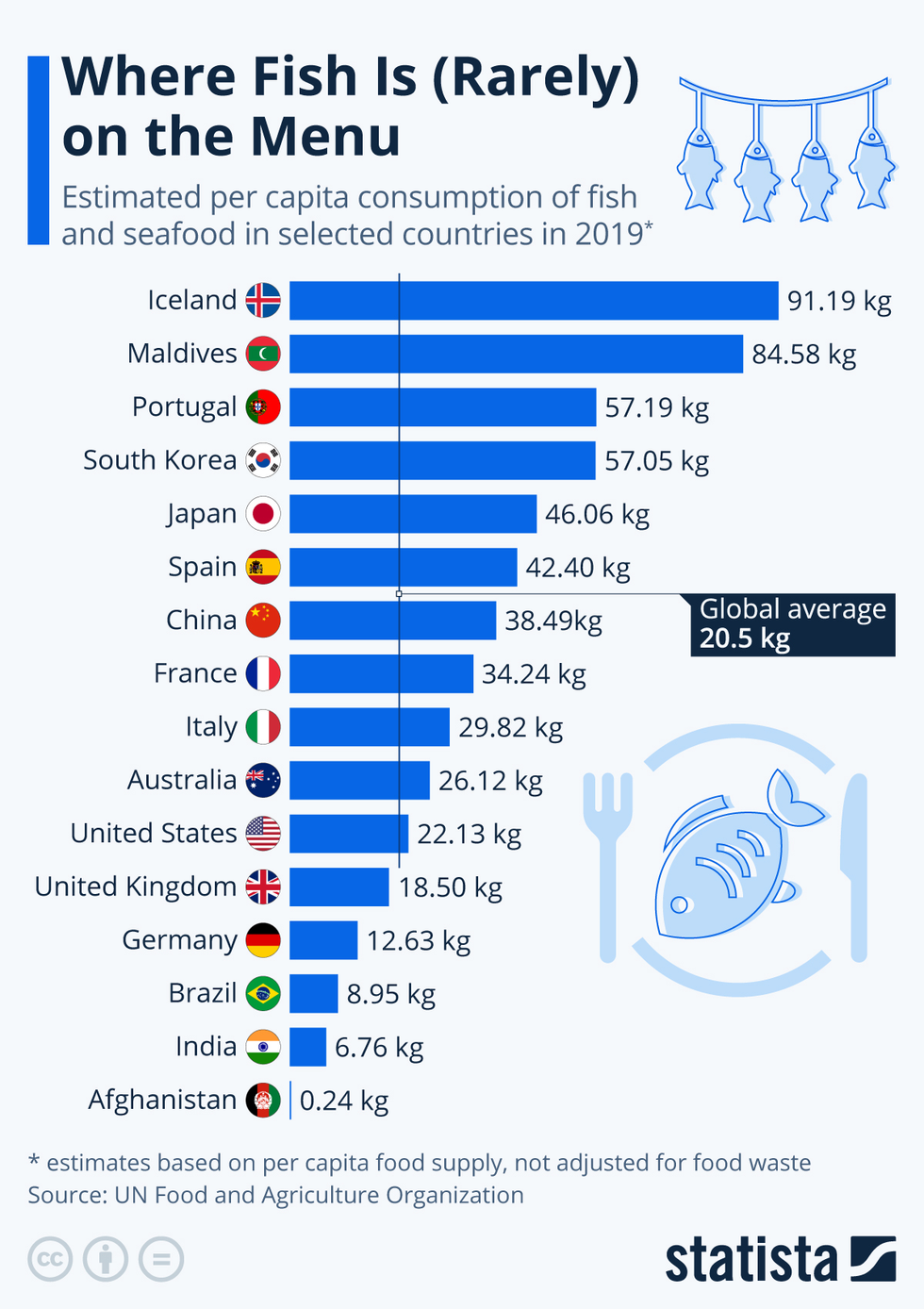Some 475,000 people are murdered worldwide each year.
Hundreds of millions more men, women, and children suffer non-fatal forms of interpersonal violence, such as domestic abuse.
Central America and the Caribbean are hotspots, with murder rates up to 10 times higher than the global average.
Honduras had a homicide rate of 35.1 cases per 100,000 population in 2022.
In contrast, Japan averaged 0.25 murders per 100,000 inhabitants that same year.
What explains this huge disparity? The wealth of a nation, the effectiveness of its law enforcement, the availability of weapons (especially firearms), and the severity of punishment for committing murder to name but a few.
Japan in particular is a fairly wealthy nation with very strict regulations regarding gun possession and murder is punishable by hanging.
However, it is not just political and socio-economic factors that explain why Tokyo looks different to Tegucigalpa.
Japan's per capita fish consumption is estimated at 46.06 kg/year, whereas Honduras averages a paltry 1.3 kg/year.
What looks like a statistical quirk may in fact reveal something profound about the global picture of violence.
Japan ranks high on the index of seafood consumption
Statista
According to Doctor Joseph Hibbeln, advisor to the US National Institutes of Health, a country’s incidence of homicide, depression and suicide tracks its seafood consumption.
A growing body of evidence suggests that a lack of omega-3 fatty acids, which are found in oily fish such as salmon and sardines, is a major cause of increased aggression.
Research has long shown a basis in the brain for aggressive and violent behavior, and that poor nutrition is a risk factor for behaviour problems.
Penn neurocriminologist Adrian Raine has for years been studying whether omega-3 supplementation, which is critical for brain function, could therefore reduce aggressive behaviour.
Publishing five randomised controlled trials from different countries, he found significant effects but wanted to know whether these findings extended beyond his laboratory.
In a study published last month in the journal Aggressive and Violent Behavior, Raine found further evidence for the efficacy of omega-3 supplementation by conducting a meta-analysis of 29 randomised controlled trials.
He estimates this intervention translates to a 30 percent reduction in aggression—across age, gender, diagnosis, treatment duration, and dosage.
Raine's meta-analysis found that omega-3 reduced both reactive aggression, which is behavior in response to a provocation, and proactive aggression, which is planned.
“I think the time has come to implement omega-3 supplementation to reduce aggression, irrespective of whether the setting is the community, the clinic, or the criminal justice system,” Raine said.
The neurocriminologist continued: “Omega-3 is not a magic bullet that is going to completely solve the problem of violence in society. But can it help? Based on these findings, we firmly believe it can, and we should start to act on the new knowledge we have.
"At the very least, parents seeking treatment for an aggressive child should know that in addition to any other treatment that their child receives, an extra portion or two of fish each week could also help."
Penn and his colleagues are pushing for omega-3 supplementation to be considered as an adjunct to other interventions, whether they be psychological (e.g. CBT) or pharmacological (e.g. risperidone) in nature, and that caregivers are informed of the potential benefits of omega-3 supplementation.
“We believe the time has come both to execute omega-3 supplementation in practice and also to continue scientifically investigating its longer-term efficacy," the study authors wrote.
Their push is gaining momentum.
“There is now clear evidence that not only are low blood omega-3 levels associated with increased aggressive behaviour but supplementation with fish oil can reduce aggressive tendencies in adults and children," said Professor William Harris from the Fatty Acid Research Institute in the US, advisor to UK charity foodforthebrain.org, which offers a pin prick home test for omega-3 backed up with a free online Cognitive Function Test and diet and lifestyle questionnaire that assesses omega-3 status and other factors that are important to brain function and development.
“Less than five percent of children in the UK achieve the basic recommended levels of fish and omega-3 fatty acid intake," lamented Doctor Simon Dyall, nutritional neuroscientist at the University of Roehampton.
“Even these recommendations are too low, according to the evidence regarding brain function. Many children and young adults eat no fish at all and have no omega-3 fatty acid supplements. The evidence is more than sufficient to recommend we take action now to protect their brains," he added.
Less than five percent of children in the UK achieve the basic recommended levels of fish and omega-3 fatty acid intake
Getty Images
In the same way that GPs test vitamin D, these scientists believe we need to test both children and adults presenting with ADHD, depression, anxiety and aggression for their omega-3 index.
“In Japan, where they eat a lot of seafood, the level [on the omega-3 index] is 10 percent and rates of violence, depression, suicide and Alzheimer’s are a fraction of those in the UK. People in the UK and US average four percent on the pinprick omega-3 index. You need over eight percent for a healthy brain. Many offenders test as low as two percent," said foodforthebrain.org founder, Patrick Holford.
Holford's non-profit charity is dedicated to generating awareness about the importance of nutrition and lifestyle for mental wellbeing and cognitive health.
“You can’t build a healthy brain without omega-3. Our children are suffering. There is more than enough evidence of this," he added.
The foodforthebrain.org founder and author of Upgrade Your Brain is calling on the the UK Government to publish recommendations on how much omega-3 we need in light of the findings.
The advice to eat fish twice a week is "neither enough, nor heeded", he says, adding: "That is why we are helping people help themselves by testing their omega-3 index and advising them accordingly. But we need this done on a national scale, especially in poorer communities. If doctors can test and prescribe vitamin D why can’t they test and prescribe omega-3?”
In a mental prison
He makes a strong case not only for the individual but society at large. A lack of omega-3 has been directly linked to increased aggression in multiple prison studies.
Prison inmates who are low in omega-3s are more aggressive and more likely to have attention deficit disorder (ADD) behaviours, a year-long study found.
Researchers from University of Wollongong, Australia, undertook a unique pilot study of more 130 volunteers at the South Coast Correctional Centre in Nowra, New South Wales.
Associate Professor Barbara Meyer and Associate Professor Mitch studied the impact of omega-3s on inmate behaviour.
Meyer, from UOW’s School of Medicine, who led the ‘Omega Man’ study, said 19 percent of inmates assessed were extremely low in omega-3s, with a median omega-3 index of 4.7 percent, which is slightly lower than the Australian median of 5-6 percent, but vastly lower than countries with rich seafood diets, such as Japan (8.5 percent) and Korea (11 percent).
“We already know that low omega-3 status is associated with increased mental health issues such as hyperactivity, poor impulse control and depression. Our study looked at the omega-3 status of inmates to see whether introducing more omega- 3 into to their diets could help reduce violence and anti-social behaviour, given about half of all Australian prisoners have been convicted for violent crimes.”
“We found a high variability in omega-3 status in the prison population, and inmates with lower omega-3 index were more aggressive and had higher ADD scores,” Professor Meyer said.
A previous small study in the UK found a 35 percent reduction in antisocial behaviour after giving omega-3 supplements to young offenders.
And a separate UK prison trial at Aylesbury jail showed that when young men there were fed multivitamins, minerals and essential fatty acids, the number of violent offences they committed in the prison fell by 37 percent.
Prison inmates who are low in omega-3s are more aggressive and more likely to have attention deficit disorder
Getty Images
What made Meyer's study unique is that it examined blood omega-3 index in conjunction with aggression and attention deficit assessments.
In her concluding remarks, the professor said it might also be possible to introduce omega-3 supplements in juvenile detention centres to help decease the likelihood of young people falling into a life of violent crime.
The finding raises ethical questions about criminal intent: how should we view an individual's culpability for a crime if they were compelled to do it because of a nutritional deficiency? How might we treat them differently?
Why this is happening
"It is well established that omega-3 fats are completely essential for emotional response. In other words, a child or adult cannot process strong emotional feelings without sufficient omega-3," Holford told GB News.
According to the nutrition expert, it's the membrane of a brain cell's neurons that communicates through a network of omega-3.
Sixty percent of the brains weight, if you take out the water, or dry weight is fatty acids, he explains.
And it is through a particular type of omega-3 fatty acid - DHA - that all signalling happens.
"In other words, all thoughts, emotions, and sensory inputs, hearing and seeing is happening across a membrane, primarily enriched with omega-3s DHA - the only source, or a direct source of which is marine foods," the author said.
Research also links low omega-3 intake to depression - another potential driver of aggression.
Omega-3s also have anti-inflammatory actions that may help relieve depression.
More than 30 clinical trials have tested different omega-3 preparations in people with depression.
Recent research led by King’s College London shows for the first time that when omega-3 polyunsaturated fatty acids (PUFAs) are given to patients with depression they are metabolised into molecules called lipid mediators and the levels of these in the blood are linked to an improvement in symptoms.
Why is this significant? Empirical studies indicate that the presence of depression elevates risk for general aggression, intimate partner aggression, and self-aggression.
Causation has not been proven but there is considerable evidence for an association between depression and aggression.
Research also links low omega-3 intake to depression - another potential driver of aggression
Getty Images
The foodforthebrain.org founder acknowledges that myriad factors can drive a person to violence.
He's also sympathetic to the UK's low rates of seafood consumption, noting that the cost can be prohibitive for poorer families.
But the cost of increased rates of violence on the NHS and social services is far higher so he's loth to take chances.
It falls on the government to step in and help those most at-risk of omega-3 deficiency, he says.
To that end, Holford and his colleagues will be writing to the health minister to get the issue of nutrition and brain health, and especially omega-3 taken "extremely seriously".
"It's impossible to process how you feel, or to make intelligent choices, such as eating fish, if your brain isn't working," he told GB News.
Couple this with the "knock-on effect" of making prisons safer, and reducing the amount of staff needed to police these environments, and it's a no-brainer, he says.
What should I eat and how much?
The NHS recommends eating least two portions of fish a week, including one of oily fish.
Holford reckons the "optimal intake" is probably three servings of oily fish a week.
He has come up with the following catchy acronym which he hopes will help people to "smash" aggression:
S for salmon
M for mackerel
A is for anchovies
S for sardines
H for herrings
Holford personally takes omega-3 supplements in addition to eating fish: "the reason I do both is that, in truth, the optimal level for brain function is 500 milligrammes of omega-3 DHA. And even that is quite hard to achieve eating fish three times a week."
But to get recommendation to eat fish three times a week would be an "amazing step forward", he tells your correspondent.
"The consequences of a lack of omega-3 are extremely expensive for society, both socially and medically, as well as costly to the individual."



